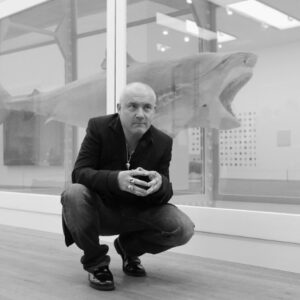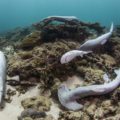
Damien Hirst is a famous English artist and art collector. He was one of the young British Artists that took over the art scene in the United Kingdom during the 1990’s. He is reportedly the United Kingdom’s richest living artist, with his wealth estimated to be around $384 million according to the 2020 Sunday Times Rich List. However, one of his artworks has spiked much controversy in the animal world.
Three of his sculptures depict animals that are preserved in formaldehyde that he claims were created in the 1990s. However, through an investigation, the Guardian has discovered the works were actually created in 2017. The sculptures depict a dove, a shark, and two calves that have been presented in galleries in Hong Kong, New York, Munich, London, and Oxford during his Turner prize winning period. Many museums displayed these pieces of art alongside other artworks that were constructed in the 1990s. Hirst’s company claims that “it is not the physical making of the object or the renewal of its parts, but rather the intentions and the idea behind the artwork”. However, when the Guardian asked a large range of art vendors, gallerists, academics and auction houses, they state the date assigned to an artwork typically refers to the date it was created. In previous Hirst artworks, he has intentionally used techniques to make the artwork look dated in previous works, but denies the use of this technique for the formaldehyde pieces.
In 2004, he created an artwork preserving a great white shark in formaldehyde cut into three distinct sections. This shark was dissected in three pieces, titled Myth Explored, Explained, Exploded, 1993-1999. However, the shark was not properly preserved and the original artwork was tossed aside. Hirst then went to kill another shark in order to continue his original intention of the artwork, repeating the same process. However, he does not limit his artwork to formaldehyde when involving animals. In 2012, his art displayed at the Tate Modern titled “In and Out of Love” involved only a room and butterflies. Live butterflies filled a windowless white room as a form of art expression, which resulted in 400 butterfly deaths per week.
It is interesting to me how Damien Hirst sparks controversy among the public, but for two contrasting groups. The art community is concerned with the correct dating of his artwork, and how he has been portraying himself in many art galleries throughout the world. The conservation community is concerned with the animal harm he is creating in order to create art for a personal profit. Both communities are concerned with crimes that his pieces have directly sparked. Personally, I think that the crime involving the animal lives to create art outweighs the crimes of false dating, however each community chooses to prioritize different aspects. Reflecting on how he makes the biggest profit off of his animal art exhibits, specifically the formaldehyde, what will force him to stop? How will art involving animals find an end if the art community is more concerned with problems such as dating over animal cruelty?







